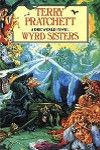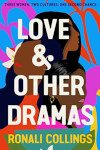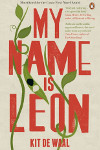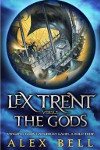David Eddings – Guardians Of The West
Posted 12th December 2011
Category: Reviews Genres: 1980s, Comedy, Fantasy
Comments Off on David Eddings – Guardians Of The West

It’s time to battle against evil once more.
Publisher: Corgi (Random House)
Pages: 423
Type: Fiction
Age: Young Adult
ISBN: 978-0-552-14802-3
First Published: 1987
Date Reviewed: 4th December 2011
Rating: 3.5/5
Please note that as this is the first book in a follow-up series, The Malloreon, to The Belgariad (also a five-book series) there may be content in this review that is considered a spoiler for The Belgariad. You might also like to note that despite the book’s cover, all of the books about this particular world were actually written by both Eddings and his wife. It is only in more recent years that this information has come to light.
Garion, now king of Riva with his wife, Ce’Nedra, as his queen, has been finding life suitably routine. It is definitely hard work being the Overlord of his fellow kings, and it’s annoying how everyone comes to him to dump their problems at his feet – but war torn the West is not. But of course there would not be a story if this routine wasn’t to change, and as another prophecy appears to begin and the Orb starts speaking once more of trouble, Garion and his friends are sure to be displaced from peace soon enough. Who is this new Child of Dark and will the Rivan royal couple ever provide the kingdom with an heir?
If you enjoyed The Belgariad, picking up Guardians Of The West feels a bit like coming home. Whereas in the first series the reader was still getting to know the characters and Eddings wrote them accordingly, in Guardians Of The West there is very much the sense that Eddings has relaxed, believing (rightly, really) that his readers know the people he is talking about. He has altered the way that he writes about them ever so slightly – they are most certainly the same characters, but now it feels as though you’ve been invited into their inner circle. This said the plot is largely the same as the previous.
There are more jokes this time round, however this is at once both a very good thing – the jokes are often very funny – and a bad thing – it can become too self-indulgent. For the most part the truly laugh-out-loud moments outweigh the lesser ones, but towards the end of the book the sheer number of lines such as Barak’s constant declarations of liking a person, and the misfit that is humour during what is purported to be a massive bloody battle, doesn’t work. The reader sees a little bit of the battle and then spends the rest of the time listening to the characters, who are all royal or high up in society, discussing strategy or simply bantering amongst themselves. Although the series is a comic fantasy, the total disregard by Eddings to present anything resembling reality in this case is difficult to get over.
Unfortunately this is joined by predictability. As soon as battles happen, nay, as soon as they are a possibility, there is no need to read further as you know exactly how it will end. Such was also the case in The Belgariad. Unlike other authors, Eddings never includes any chances that the characters will fail. Although you know, considering the genre, that good will ultimately triumph, there is never any sense of danger. The characters arrive, talk for a bit, attack, win, find they haven’t won completely, go back to talk more, and etcetera. And winning is all too easy for them.
In regards to strategy, once the main crux of the book begins the narrative always going back to discussions. The discussions take ages, and while there can be interest in the minute details Eddings goes into, one can’t help but wonder if Eddings ought to have joined the army instead of becoming a writer because he clearly has a passion for working things out. Once the characters win, someone comes along to tell them that they haven’t actually won, and that is part of the cycle of repetition; there are a good several strategic discussions within a fifth of the book’s pages. After the first couple of discussions it becomes dreadfully boring.
Interspersed are pointless dialogues, silly ideas, and things the reader didn’t need to know. Indeed when the characters finally discover the true next step, one that needs to be taken then and there, they sit down for alcohol and humorous conversation. And individual characters are always going off to do something secret, something that generally turns the tide on things within the blink of an eye. The extensive use of magic to solve problems, despite the fact that the book is a fantasy and is therefore “allowed” to use magic, can make things that might have been exciting rather dull. And in addition to all of this, Ce’Nedra’s constant refrain of “I want my baby”, despite the reader’s knowledge of her personality, can make a person want to change the text so that she is less selfish and remembers that it takes two to make one.
So while Eddings knows how to plan battles, he does not know how to stage the action. But he does know a lot about showing rather than telling, which of course has a lot to do with the negative aspects but is overall a winner. Although he may be influenced by the likes of Tolkien, Eddings never goes down the path of describing so much scenery that you fall asleep. He prefers to tell his tale through dialogue, which makes his book a quick read. And for the most part his characters are well-defined, they never lose their personality and apart from the times when they are all complimenting each other too much it would be easy enough to be able to read the conversations between small groups without the name labels of who said what.
You have to be prepared that nothing will really happen for the vast majority of the book – unless you don’t mind reading about domestic routine – and that it is filled by short dips into the lives of the characters over the course of several years. Why Eddings felt the need to leave such a gap yet still try and fill the reader in is incomprehensible, he may as well have just begun by summarising. He wanted Errand to be more grown up, and that makes sense, but we do not learn that much about Errand that couldn’t have been condensed into a few pages. Some of the plot points are very interesting, but when Eddings employs a written, and thus longer, version of what film makers do to show the passing of time (think quick shots of scenes and music overlays) one does wonder why he is doing it.
Eddings is good at creating stories, but his writing could have done with more polish. Some phrasing is awkward and the modern Americanisms don’t always fit the rest of the text. This particular edition of the book is rife with errors that should have been picked up during the editing process and it’s just lucky that the story is strong enough to keep the reader from becoming distracted by them.
Guardians Of The West is a rather flawed book, but the setting and characters balance out the problems. It may work as a stand-alone, but is best read after having finished The Belgariad because the characters will likely appear funnier and the information gleaned from that first series helps to explain this one. Fans of fantasy will find it okay, but this series is definitely for those with a love for quick comedy.
Related Books
Jennifer Greene – No More Mr. Nice Guy
Posted 28th August 2011
Category: Reviews Genres: 1980s, Romance
Comments Off on Jennifer Greene – No More Mr. Nice Guy

A person can change, but only if they want to.
Publisher: Carina Press
Pages: 120
Type: Fiction
Age: Adult
ISBN: 978-1-4268-9154-0
First Published: 1986
Date Reviewed: 5th May 2011
Rating: 3/5
Carroll loves Alan, but she wants more spontaneity in their relationship, more spark. Alan feels he’s losing Carroll and so quickly shakes up routine. But is it what Carroll really wants and is Alan happy enough to stay that way?
What I liked about this book, and something that is new to me in my recent foray into romance, is just how ordinary the characters are.
Reading a book written in the 1980s about a couple in the 1980s took a bit of getting used to because, having had the late 1990s as the time in my life when I really started noticing the world, reading about the 80’s fashions as being sexy was against everything I grew up hearing. But to have a book discuss a relationship without mobile phones or laptops, and with kettles whistling on the stove, was something that soon became a treat. As a society we know how much we rely on technology and a lot of us do yearn sometimes for the old days, so a book with an eternal theme and without the flat-screens was wonderful.
The story is just as ordinary as the characters, a person changing to try and win over the person they believe they are losing, and therefore the appeal is general. I expect most people would identify with it, at least to some extent. I know I did. But there were a few things that did irk me greatly.
One was the story, because it was so ordinary and simple I couldn’t help but feel it should have been shorter. I know that chick-lits can be the same but the writing style of this book favoured shortness, shorter than it’s 120 pages, and there weren’t enough different “episodes” to it. The other major issue I had was with the spelling of Carol as Carroll (really?) and the shortening of it to Caro, which just sounded weird.
There is character development but although in reality it would be considered important, on paper it came across as minor and was too quick, and I think I would’ve liked to read more about the couple’s relationship before Alan opted to change himself.
The changes themselves though, albeit extreme, I could well imagine. In fact being a woman who is completely thrown by sudden romantic gestures by an otherwise unromantic man, I related to it perfectly.
There could have been more in this story and the lack of secondary and tertiary genres definitely hindered it, but I will say that when compared to many romance authors (for I have started several books only to abandon them) Greene’s writing style is finer. There was a great little scene in which a fever (as in the sickness) creates a dream sequence for Carroll with Alan that was rather fun to read about, and the very end dialogue is great.
No More Mr. Nice Guy is a sweet story with a universal theme. It’s incredibly, incredibly ordinary, but that might just be the point.
Related Books
Terry Pratchett – Wyrd Sisters
Posted 6th January 2011
Category: Reviews Genres: 1980s, Comedy, Fantasy
3 Comments

How can you describe a Discworld novel in a couple of sentences? Answer: you can’t.
Publisher: Corgi (Random House)
Pages: 328
Type: Fiction
Age: Adult
ISBN: 978-0-552-13460-6
First Published: 1988
Date Reviewed: 21st December 2010
Rating: 4.5/5
When the king of Lancre is killed, the witch Granny Weatherwax and her coven (well ok, only Magrat calls it a coven, because she’s all traditional-like and believes in doing things correctly) find themselves left with his son. Luckily for them there’s a theatrical troupe in town that Granny thinks will make the perfect guardians even if the strange people do seem to still be alive after dying on stage. But one day the boy will have to return, and as it’s destiny the witches may as well not bother to go and find him.
I’ve never attempted to review a book from this series before because it is just so difficult. The overall plot may be easy enough to talk about but Pratchett goes off on so many tangents that often you can forget what the purpose of a particular scene’s events was.
“My name is unpronounceable in your tongue, woman,” it said.
“I’ll be the judge of that,” warned Granny, and added, “Don’t call me woman.”
“Very well. My name is WxrtHltl-jwlpklz,” said the demon smugly.
Personally I’ve found that the series gets funnier and funnier as it continues, and Wyrd Sisters doesn’t buck the trend. There were a good few times where I was in tears of laughter, so much so that when my phone rang I felt the need to inform the caller that I wasn’t upset. It has a lot to do with the number of characters. Each is vastly different, although you may not notice it while reading because the emphasis is on the humour. This means that there is a place for slight differences in the humour and for Pratchett to really enforce his stereotypes.
As always, inanimate objects get just as much time as people and animals, in particular a solo stone that hides behind a bush when anyone tries to count it. And a minor character is a storm looking to become the next hurricane.
The apple-seller gambit had never worked more than once in the entire history of witchcraft, as far as she knew, but it was traditional.
There are a lot of references to old stories and tradition but unlike the current trend of being very specific and thus dating a book, Pratchett is general and his references are ones likely to remain public knowledge for a long time, such as fairytales. The writing style is another cause for laughter because although Pratchett is not the most eloquent of authors, it doesn’t matter one bit. The book is joke after joke after joke and actually the categorising of the series as fantasy does it an injustice, you don’t need to like fantasy to like the Discworld novels.
If you’ve never read a Discworld novel I would advise starting with either this or Mort because although the first is good, it’s not the best. Wyrd Sisters has the advantage of little background history (which you don’t really require anyway) and as mentioned before, the different characters.
Pratchett’s humour can become wearing if you read too much of his work at once but if you space it out it can add something unique to your reading experience.

























